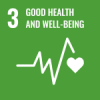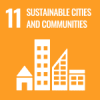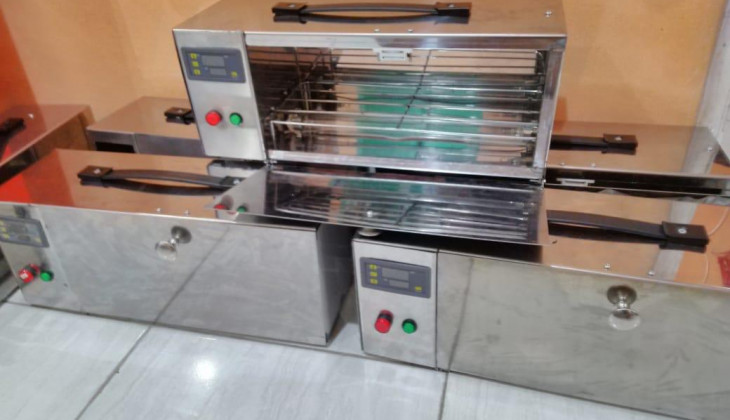In response to the scarcity and high price of N95 masks, which increased during this pandemic, an UGM research team developed a sterilizing device for N95 masks so that these masks can be used repeatedly in hospitals and health clinics. Using the power of ultraviolet C (UV-C) light that is exposed for five minutes, this tool has been shown to effectively kill germs and the Covid-19 virus in previously worn masks.
One of the members of the research team, dr. Trisasi Lestari, MD., M.Med.Sc from the Faculty of Medicine, Public Health and Nursing (FKKMK) UGM said that the manufacture of this tool was in collaboration with researchers from the UGM Faculty of Engineering. The initial idea of making it was motivated by the difficulty experienced by medical personnel in procuring N95 masks in the market. “The price of N95 masks has risen extremely highly in this Covid era. It has increased more than 10 times the normal price. In fact, even before Covid, the price of N95 masks was already more expensive than surgical masks because of their better filter function,” he said in a conversation with reporters on Wednesday (13/5).
According to him, the scarcity of N95 masks does not only occur in Indonesia, but also throughout the world. The World Health Organization (WHO) has allowed the use of N95 masks repeatedly by sterilizing them first until the masks look dirty or damaged. “Ideally, no more than 3 times sterilization. Many hospitals make N95 mask sterilizers but without calculating the strength of a UVC lamp or a good exposure time, which in turn can damage the masks. We feel encouraged to make a UVC sterilizer that is especially designed for N95 masks,” he said.
According to him, not only at the time of Covid, the idea to sterilize N95 masks, according to him, had been around for a long time since he handled many patients with Tuberculosis (TB). “To treat MDR TB patients, you must use an N95 mask. Its availability is also limited and one mask can be worn for up to one week by TB officers at the primary health center by only hanging/aeration in the sun to sterilize it due to limited facilities,” he said.
Even so, he was grateful that at the time of this pandemic the idea was realized by cooperating with other researchers from the UGM Faculty of Engineering. “I proposed it to a group of engineering lecturers and was welcomed and supported by Eka Firmansyah and his students to produce the tools,” he explained.
He said the process of making this tool began in early April and was completed within one month. The tool is also made in two sizes that can accommodate 3 or 9 masks at once. According to him, the selection of UV-C ultraviolet light waves were with careful consideration so as not to damage the quality of the mask when sterilized. “We use UV-C light waves with wavelengths between 250-270nm, proven to be able to directly damage the DNA and RNA of bacteria or viruses so that the effect is deadly to bacteria and viruses themselves,” he said.
The mask sterilization process using UV-C ultraviolet light only takes about five minutes to kill germs and viruses that stick to the mask. “For the box that we made with a sterilization time of 5 minutes, it has been proven that no germs have grown,” he explained.
He added that this sterilizer not only can be used for masks, but also for other medical devices such as scissors, scalpels, and gauze. “We have not measured the effective duration of the exposure. But the assumption is that a 5-10 minute exposure time is deadly enough,” he said.
This tool, said Trisasi, is planned to be distributed, first to several health centers and hospitals in Yogyakarta, including the FKKMK Microbiology Lab where this tool is tested. The plan is that this tool will continue to be developed so that it can be mass produced. “Hopefully later it can be produced at a cheaper price so that it is affordable and can be available in all health centers and other health facilities in Indonesia,” he hoped.
While research member, Dr. Eka Firmansyah from the UGM Faculty of Engineering, said that sterilization using ultraviolet-C (UV-C) light is one of the methods commonly used to decontaminate bacteria or viruses. “Exposure to UV light with the right dose, not excessive, can reduce the risk of damage to the N95 mask filter so it is safer to use repeatedly,” he said.
Eka said that his team has made two designs, the first type has internal dimensions of 40 cm x 40 cm x 30 cm and external dimensions of 40 cm x 40 cm x 40 cm. These dimensions allow for a 48 liter volume sterilizer that can sterilize 9 N95 masks. The second type has internal dimensions of 35 cm x 15 cm x 15 cm and external dimensions of 45 cm x 15 cm x 17 cm. This dimension has a sterilization chamber with a capacity of 7.8 liters which can sterilize 3 N95 masks.
Eka said that the UV Box production process was being carried out by the startup company MicroMachina, which was founded by a group of Engineering students.
Source: https://ugm.ac.id/id/berita/19423-ugm-kembangkan-alat-sterilisasi-masker-n95



